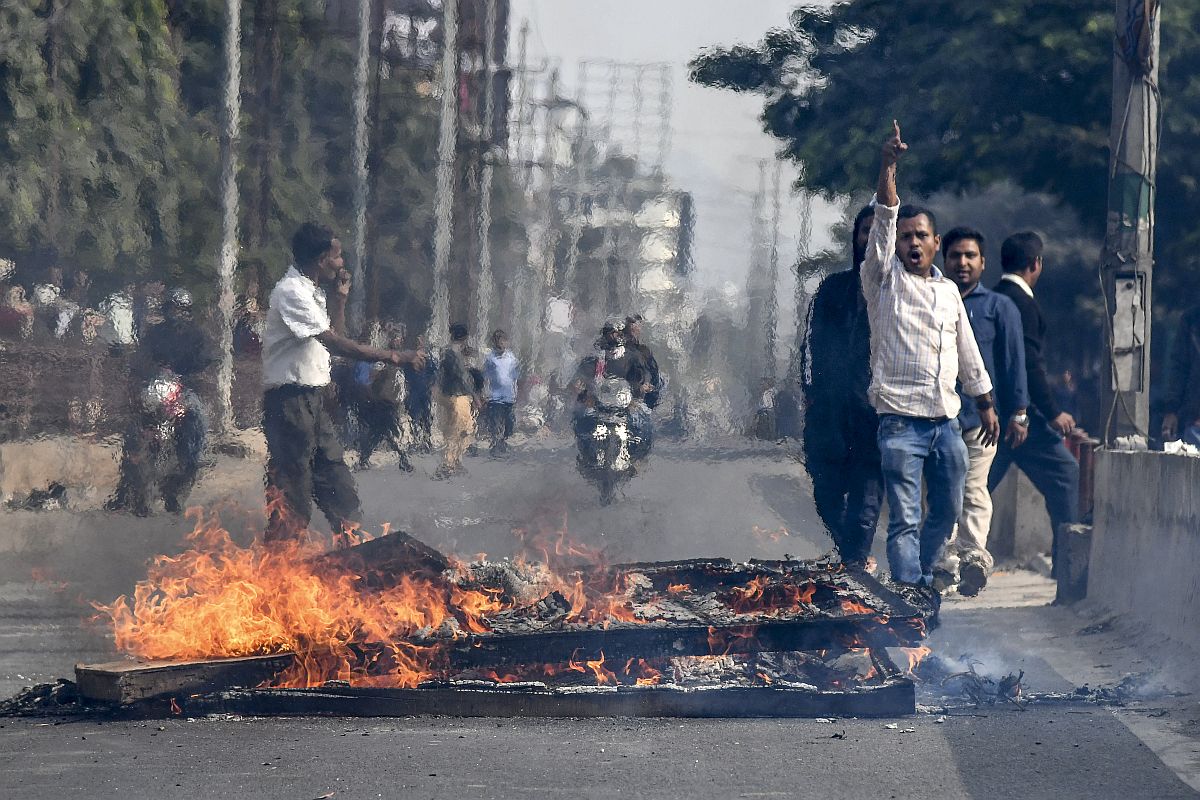UN chief urges efforts to end crisis in Congo
UN Secretary-General Antonio Guterres has called for more efforts to end the crisis in the eastern Democratic Republic of the Congo (DRC).
The rights body said that the amended law ‘appears to undermine the commitment to equality before the law enshrined in India’s Constitution’.

Demonstrators shout slogans as they stand next to a burning barricade during a protest against the government's Citizenship Amendment Bill (CAB) in Guwahati. (File Photo: AFP)
The United Nations human rights body on Friday expressed its concerns over India’s new Citizenship Act and termed the law “fundamentally discriminatory” in nature.
“We are concerned that India’s new Citizenship (Amendment) Act 2019 is fundamentally discriminatory in nature,” Jeremy Laurence, a spokesperson for UN Human Rights chief, Michele Bachelet, told reporters in Geneva.
Advertisement
The office of the UN High Commissioner for Human Rights (OHCHR) also expressed concern about the reports of two people getting killed in anti-CAB protests and called on all sides to not resort to violence.
Advertisement
The rights body further said that the amended law “appears to undermine the commitment to equality before the law enshrined in India’s Constitution”.
“The amended law would appear to undermine the commitment to equality before the law enshrined in India’s Constitution and India’s obligations under the International Covenant on Civil and Political Rights and the Convention for the Elimination of Racial Discrimination, to which Indian is a State party, which prohibit discrimination based on racial, ethnic or religious grounds,” the spokesperson said.
He added that while India’s broader naturalisation laws remain in place, amendments brought through the latest act “will have a discriminatory effect on people’s access to nationality”.
The UN Human rights chief’s spokesperson said that all migrants, regardless of their migration status, are entitled to “respect, protection and fulfilment of their human rights”.
The spokesperson also sought to remind that India had endorsed the Global Compact for Safe, Regular and Orderly Migration just a year ago.
“Just 12 months ago India endorsed the Global Compact for Safe, Regular and Orderly Migration, which commits States to respond to the needs of migrants in situations of vulnerability, avoiding arbitrary detention and collective expulsions and ensuring that all migration governance measures are human rights-based,” Laurence said in a statement.
At least two persons died due to bullet injuries on Thursday after police opened fire on protesters in Guwahati, capital of Assam.
President Ram Nath Kovind, in a late Thursday night order, gave his assent to The Citizenship (Amendment) Bill, 2019, letting it become an Act allowing Indian citizenship to six non-Muslim minority migrants facing religious persecution in Pakistan, Bangladesh and Afghanistan.
According to the new law, members of Hindu, Sikh, Buddhist, Jain, Parsi and Christian communities, who have come from Pakistan, Bangladesh and Afghanistan, till December 31, 2014, facing religious persecution there, will not be treated as illegal immigrants but given Indian citizenship.
The Act says the refugees of the six communities will be given Indian citizenship after residing in India for five years, instead of earlier requirement of 11 years.
The proposed legislation was welcomed with violent protests across the northeast as locals and students hit the streets in thousands, burning tyres and wooden logs prompting the administration to impose curfew in Assam and suspend mobile internet services.
Earlier, the United Nations had said that it was closely analysing the possible consequences of India’s amended Citizenship Act while insisting that the world body has its basic principles, including those enshrined in the Universal Declaration of Human Rights, and expect those to be upheld.
“We’re aware that the lower and upper houses of the Indian Parliament have passed the Citizenship Amendment Bill, and we’re also aware of the concerns that have been publicly expressed. The United Nations is closely analysing the possible consequences of the law,” Farhan Haq, Deputy Spokesman for the UN chief Antonio Guterres had said on Thursday.
Haq added that he would also like to draw attention to the fact that some of the UN human rights mechanisms, including rapporteurs, have already been expressing their concerns about the nature of this law, and you can see those from the Human Rights Office.
Advertisement